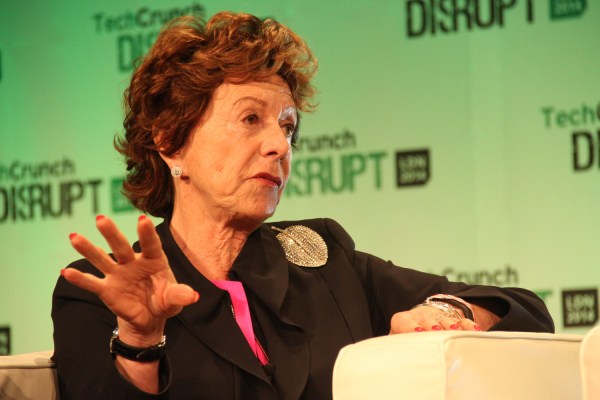The European Commission’s Neelie Kroes has urged those with “interesting business ideas” burning a hole in their brain to “apply, apply, apply” for research funding from the EC — despite conceding that the application process can be a “jungle” to fight through.
Kroes, the outgoing European Commissioner for the Digital Agenda — which covers both IT and the telecoms sector — was being interviewed on stage on a range of digital issues by TC’s Mike Butcher, here at TechCrunch Disrupt London.
Topics covered during the fireside chat included net neutrality, telcoms market reform and the European Court of Justice privacy court ruling on search de-listing, She was also asked what she saw as her overall legacy in charge of the digital portfolio as she prepares to step down from the role. Her position will be taken over by three commissioners, with the role splitting to include a commissioner for the Digital Single Market and another for the Digital Economy and Society.
Asked specifically why the EC funnels so much research money towards established companies, under its Horizon 2020 program, money that could instead go towards entrepreneur driven companies, Kroes urged startups to make a bid for a chunk of the cash. She also noted there are dedicated EC funding pots for startups.
“Apply, apply, apply,” she said. “All those youngsters who have interesting business models let them apply.”
“It is indeed paperwork,” she added, referring to what she termed the “jungle” of navigating applications for this type of European funding, but said she is pushing for the process to be easier.
Asked how founders could navigate this “jungle” — and whether they should try emailing her directly, she said: “Start with that. Don’t give up. Just find your way. And don’t think that it is too difficult for you for there is also a lot of fairy tales eventually.”
“I am absolutely on your page when you were saying it is quite a bit of red tape and we need to get rid of that,” she added.
Asked about the European mindset and whether there are cultural issues holding back startups here, Kroes said that while Europe’s startup ecosystem contains “very smart people and very creative, out-of-the-box-thinking people”, she said too many Europeans still have a tendency towards risk aversion, and are still too afraid of failing.
“So many people still are risk avoiding and that is never ever getting you to a higher level,” she said. “Failure is not a negative one. Absolutely, also in Silicon Valley, of every 10 startups nine are failures. But then they take the initiative.”
Getting European entrepreneurs to get better at viewing one failed startup as just the next step in the journey is crucial, she added. ” You need failures to get more success.”
Discussing the recent European court ruling on the so-called ‘right to be forgotten’, Kroes also talked about the need to educate young people about the privacy implications of posting personal information on digital services.
“The right to be forgotten shouldn’t be used as an argument by parents or whoever [to avoid educating kids]. They should indeed educate their youngsters that they have to take into account that when they push that send button it’s gone,” she said.
“Be very, very careful,” she added.
The right to be forgotten refers to a European Court of Justice ruling earlier this year which found that search engines are data controllers and therefore subject to European data protection legislation — meaning they must accept and process requests from private individuals to de-list specific link results from a search for their name.
Butcher asked whether this court ruling could have a negative impact on entrepreneurs, since it prioritizes individual privacy over digital data. “Be awake when dealing with this,” said Kroes. “It’s very, very important we are teaching and educating our younger people about putting something on their devices and pushing the button, send and it’s gone.”
“I think that Google at the moment are doing whatever they can,” she added, addressing the implementation of the ruling by Google. “Again, it is an open society so we should get used to that — and it is a different mindset.”
Asked what she saw as her legacy as VP for the Digital Agenda, Kroes said: “Nearly everyone is aware that digital is… a fact. It is a digital economy. Everyone is aware that it is connected with his or her life, talking about health, talking about the aging population, culture, and education needs.”
[gallery ids="1072605,1072604,1072603,1072602,1072601,1072600,1072599,1072598,1072597"]
